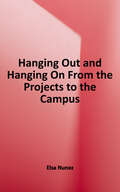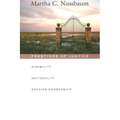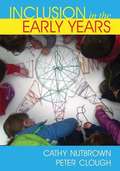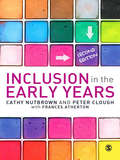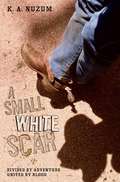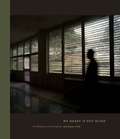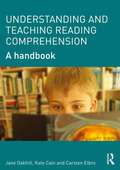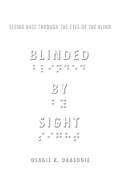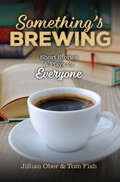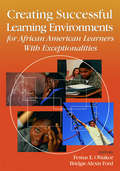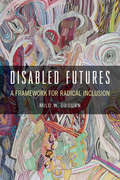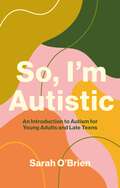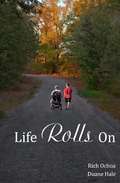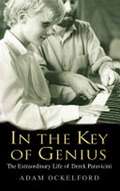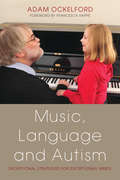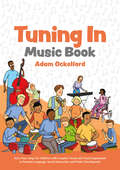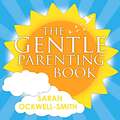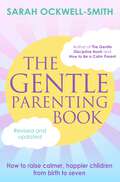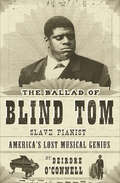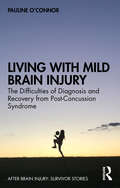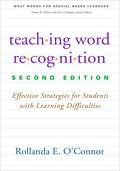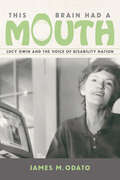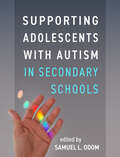- Table View
- List View
Hanging Out and Hanging On: From the Projects to the Campus
by Elsa NunezThis book chronicles the progress of students from Hartford and Manchester, Connecticut, who are enrolled in the Dual College Enrollment Program (DCEP) at Eastern Connecticut State University. <p><p>“Hanging Out” sets the stage for describing the program by first reaching back in time to tell of Dr. Núñez’s own beginnings in Puerto Rico and Newark, New Jersey, of her struggles as a non-English speaking elementary school student and her triumphs in high school and college. The next section of the book describes the lives of Latinos in Connecticut and the social, economic, and educational challenges they have faced over time. Her personal experiences and desire to improve the lives of the underprivileged led Dr. Núñez to create the DCEP Program. <p><p>Through the words of faculty and staff and the personal accounts of six DCEP students, you will read stories of desperation and hope, of struggle and triumph, of heart-breaking failure and stunning success. We hope their story can serve as a model for other communities to follow.
Frontiers of Justice: Disability, Nationality, Species Membership
by Martha C. Nussbaumgeneral and the timeless. Yet such theories, addressing the world and its problems, must respond to the real and changing dilemmas of the day. A brilliant work of practical philosophy, Frontiers of Justice is dedicated to this proposition. Taking up three urgent problems of social justice neglected by current theories and thus harder to tackle in practical terms and everyday life, Martha Nussbaum seeks a theory of social justice that can guide us to a richer, more responsive approach to social cooperation.<P><P> The idea of the social contract--especially as developed in the work of John Rawls--is one of the most powerful approaches to social justice in the Western tradition. But as Nussbaum demonstrates, even Rawls's theory, suggesting a contract for mutual advantage among approximate equals, cannot address questions of social justice posed by unequal parties. How, for instance, can we extend the equal rights of citizenship--education, health care, political rights and liberties--to those with physical and mental disabilities? How can we extend justice and dignified life conditions to all citizens of the world? And how, finally, can we bring our treatment of nonhuman animals into our notions of social justice? Exploring the limitations of the social contract in these three areas, Nussbaum devises an alternative theory based on the idea of "capabilities." She helps us to think more clearly about the purposes of political cooperation and the nature of political principles--and to look to a future of greater justice for all.
Inclusion in the Early Years
by Cathy Nutbrown Peter CloughIn this insightful text, the authors argue for a broad definition of inclusion, not limited to those with learning difficulties or impairment. The book presents a number of original stories generated from a recent research project carried out by the authors, and shows how to apply theory to practice. This new and revised edition includes an increased focus on: -Inclusion as a political issue -Social class -Poverty -Children's rights -The inclusion of gay and lesbian parents and staff -Practical activities including workshops and role-plays -Different policies around the UK This text is essential for all Early Years students, practitioners and researchers who want to become familiar with current research into inclusion and to develop ways of drawing on such studies to inform and develop their own inclusive practices. Cathy Nutbrown is Professor of Education and Director for Research at the University of Sheffield. Peter Clough is Honorary Professor of Education at the University of Sheffield Frances Atherton is Head of Department of Early Childhood Studies, at the University of Chester.
Inclusion in the Early Years: Critical Analyses And Enabling Narratives
by Cathy Nutbrown Peter Clough Frances AthertonThis insightful text shows how the attitudes of adults in early years settings can influence practice. The authors argue for a broad definition of inclusion, not limited to those with learning difficulties or impairment, but addressing factors affecting all members of the learning community. The book shows how the lives of practitioners, parents and children have been affected by inclusive and exclusionary practices. This new and revised edition includes an increased focus on: - inclusion as a political issue - social class - poverty - children's rights - gay and lesbian parents and staff This text is essential for all early years students, practitioners and researchers who want to become familiar with current research into inclusion and to develop ways of drawing on such studies to inform and devleop their own inclusive practices. Cathy Nutbrown is Professor of Education and Director for Research at the University of Sheffield. Peter Clough is Honorary Professor of Education at the University of Sheffield Frances Atherton is Head of Department of Early Childhood Studies, at the University of Chester.
A Small White Scar
by K. A. NuzumFifteen-year-old Will Bennon has always looked after his twin brother, Denny, who has Down syndrome, but now Will is ready to leave his family's ranch and become a professional cowboy, but Denny unexpectedly joins the journey.
My Heart Is Not Blind: On Blindness And Perception
by Michael NyeMy Heart Is Not Blind: On Blindness and Perception is a collection of stunning portraits of blind and visually impaired people taken by photographer Michael Nye. Each image is accompanied by an intimate story told by the subject concerning his or her experiences and unique perspective. The causes of vision loss range from genetic predispositions (retinitis pigmentosa) or disease (glaucoma) to external circumstances such as accidents (struck by a train) or violence (gunshot wound). The people in this diverse group differ not only in their particular conditions and losses but also in their cultural and socio-economic backgrounds. Taken as a whole, however, the accounts of adapting to changing modes of perception are bound by a common theme of resilience, revealed in shared reactions and unexpected insights. The subjects depicted in My Heart Is Not Blind share their experiences and unique perspectives in a personal narratives that accompany their respective portraits. Most speak of the transition from sight to vision loss, and how that has changed―and not changed―their ability to perceive the surrounding world. Some question the classification of blindness as a disability. One participant proposes that blindness may, in some ways, even aid in perception, musing, “if you can always see the sun, you can never discover the stars.” My Heart Is Not Blind offers a window into the world of the blind and visually impaired, revealing surprising similarities and fascinating differences alongside compelling accounts of survival, adaptation, and heightened understanding. The collection invites us to reconsider what we think we know about blindness in order to gain a deeper understanding of vision and perception.
Understanding and Teaching Reading Comprehension: A handbook
by Jane Oakhill Kate Cain Carsten ElbroThe ultimate aim of reading is not the process but to understand what we read and comprehension can take place at many different levels. There has been an increasing emphasis on the importance of reading comprehension in recent years but despite this there is very little written on this vital topic accessible to trainee and practicing teachers. The Handbook of Reading Comprehension presents an overview of recent findings on reading comprehension and comprehension problems in children. It provides a detailed examination of the characteristics of children who have reading comprehension difficulties, and examines ways in which comprehension can be supported and improved. It is accessibly written for students and professionals with no previous background in the psychology of reading or reading problems. This indispensable handbook asks the question ‘what is comprehension?’ The authors consider comprehension of different units of language: understanding single words, sentences, and connected prose and outline what readers (and listeners) have to do to successfully understand an extended text. This book also considers comprehension for different purposes, in particular reading for pleasure and reading to learn and explores how reader characteristics such as interest and motivation can influence the comprehension process. Different skills contribute to successful reading comprehension. These include word reading ability, vocabulary knowledge, syntactic skills, memory, and discourse level skills such as the ability to make inferences, knowledge about text structure, and metacognitive skills. The authors discuss how each one contributes to the development of reading comprehension skill and how the development of these skills (or their precursors) in pre-readers, provides the foundation for reading comprehension development. Areas covered include:- Word reading and comprehension Development of comprehension skills Comprehension difficulties Assessment Teaching for improvement Throughout the text successful experimental and classroom based interventions will be highlighted, practical tips for teachers and summary boxes detailing key points and explaining technical terms will be included in each chapter
Blinded by Sight: Seeing Race Through the Eyes of the Blind
by Osagie K. Obasogie<P>Colorblindness has become an integral part of the national conversation on race in America. Given the assumptions behind this influential metaphor—that being blind to race will lead to racial equality—it's curious that, until now, we have not considered if or how the blind "see" race. Most sighted people assume that the answer is obvious: they don't, and are therefore incapable of racial bias—an example that the sighted community should presumably follow. <P>In Blinded by Sight,Osagie K. Obasogie shares a startling observation made during discussions with people from all walks of life who have been blind since birth: even the blind aren't colorblind—blind people understand race visually, just like everyone else. Ask a blind person what race is, and they will more than likely refer to visual cues such as skin color. Obasogie finds that, because blind people think about race visually, they orient their lives around these understandings in terms of who they are friends with, who they date, and much more. <P>In Blinded by Sight, Obasogie argues that rather than being visually obvious, both blind and sighted people are socialized to see race in particular ways, even to a point where blind people "see" race. So what does this mean for how we live and the laws that govern our society? Obasogie delves into these questions and uncovers how color blindness in law, public policy, and culture will not lead us to any imagined racial utopia.
Something's Brewing: Short Stories And Plays For Everyone
by Jillian Ober Tom FishDelightful stories about navigating the ups and downs of adulthood while living with a disability. The characters' perspectives are fresh and honest as they overcome heartbreak, face disappointments, renew friendships and celebrate triumphs. An informative read for anyone who is curious about what it is like to live with a disability, or just wants a feel good tale about the power of friendship and belonging. <P><P> Tom and Jillian have done it again - engaging their audience in stories that speak to the lived experience of individuals with developmental disabilities. Being able to see and hear oneself in the characters of a story or play is empowering. The characters in Something's Brewing are sure to be a hit with readers around the world.
Creating Successful Learning Environments for African American Learners With Exceptionalities
by Dr Festus E. Obiakor Dr Bridgie Alexis FordIn this groundbreaking book, more than 25 leading scholars and practitioners provide concrete solutions for maximizing African American students' achievement.
Disabled Futures: A Framework for Radical Inclusion (D/C: Dis/color #3)
by Milo W. ObournDisabled Futures makes an important intervention in disability studies by taking an intersectional approach to race, gender, and disability. Milo Obourn reads disability studies, gender and sexuality studies, and critical race studies to develop a framework for addressing inequity. They theorize the concept of “racialized disgender”—to describe the ways in which racialization and gendering are social processes with disabling effects—thereby offering a new avenue for understanding race, gender, and disability as mutually constitutive. Obourn uses readings of literature and popular culture from Lost and Avatar to Octavia Butler’s Xenogenesis trilogy to explore and unpack specific ways that race and gender construct—and are constructed by—historical notions of ability and disability, sickness and health, and successful recovery versus damaged lives. What emerges is not only a more complex and deeper understanding of the intersections between ableism, racism, and (cis)sexism, but also possibilities for imagining alternate and more radically inclusive futures in which all of our identities, experiences, freedoms, and oppressions are understood as interdependent and intertwined.
So, I'm Autistic: An Introduction to Autism for Young Adults and Late Teens
by Sarah O'Brien'There isn't a secret manual outlining exactly how to get through your teens and young adulthood as an autistic individual, but this book provides a script for how to do what adulthood will make you do anyway, in a way that is most accessible for you".You've just received an autism diagnosis, so why do you still feel so lost when it comes to what autism actually means for you?Written by autistic advocate Sarah O'Brien, this book gives a much-needed introduction into what autism is and removes the myths, stereotypes and stigma that surround it. Sarah provides insights into what to do after diagnosis and how to approach and navigate the process of informing those in your life, from your family and friends to your teachers or manager at work. Utilising her own experience of feeling lost after diagnosis and navigating all of the 'firsts' of adolescence and young adulthood Sarah provides an honest and friendly voice to guide you through it all.Intelligent and clearly-written, this is the fact-led and information-rich resource that will answer your questions about autism, introduce you to your new community and set you up to thrive as an autistic adult.
Life Rolls On (2nd Edition)
by Rich Ochoa Duane HaleWhen he was four years old, doctors told Duane Hale's parents that their son had Spinal Muscular Atrophy and that he wouldn't live past his teens. That was forty-two years ago and he has now outlived some of those doctors. What happens to a rambunctious little boy whose disease turns him into a man who can't move? How does such a man graduate high school as Student of the Year, work twenty years for the police department, buy a house, get married, father and raise a son?This is the story of a man and the strength he derives from his family and his community. Even as the disease paralyzes more of his body every day his spirit stays strong and Life Rolls On.
In The Key Of Genius: The Extraordinary Life Of Derek Paravicini
by Adam OckelfordDerek Paravicini is blind, can't tell his right hand from his left and needs round-the-clock care. But he has an extremely rare gift - he is a musical prodigy with perfect pitch whose piano-playing has thrilled audiences at venues from Ronnie Scott's to Las Vegas, the Barbican to Buckingham Palace. <p><p> Born prematurely, Derek remained in hospital for three months and technically 'died' several times before he was finally strong enough to go home. It was not long before his blindness became apparent and later it became clear that he had severe learning difficulties and autism. <p> Desperately trying to find something to engage and stimulate baby Derek, his nanny discovered a toy organ and put it down in front of him. Miraculously, Derek taught himself to play. Music proved to be an outlet for expressing himself and communicating with others - his way of dealing with a strange and confusing world.
Tuning In Music Book: Sixty-Four Songs for Children with Complex Needs and Visual Impairment to Promote Language, Social Interaction and Wider Development
by Adam OckelfordContaining 64 songs designed to promote language, social and musical development, this book accompanies the Tuning In Cards so you can perform the songs and integrate the activities into your own practice. When paired with the Tuning In Cards, it will offer an innovative way of developing communication in children with profound disabilities, visual impairment, and autism.These songs have been developed in line with the Sounds of Intent framework, and a helpful introduction by the composer describes how to adapt the songs and activities to the appropriate developmental level.
The Gentle Parenting Book: How to raise calmer, happier children from birth to seven (Gentle #3)
by Sarah Ockwell-SmithParenting trends come and go. Gentle parenting is different - it isn't a label for a precise set of rules but a method of parenting that embraces the needs of parent and child, while being mindful of current science and child psychology. It means parenting with empathy, respect, understanding - and boundaries.In The Gentle Parenting Book, Sarah Ockwell-Smith provides a trustworthy combination of what-to-expect information and gentle-parenting solutions to the most common challenges faced by parents with young children. Sarah addresses a wide variety of topics, including coping with a crying baby, introducing solid foods and creating healthy eating habits, potty training, starting nursery and school, sibling rivalry, tantrums, whining and sulking, aggressive behaviour and much more.And for those parents who have previously used a more authoritarian style of parenting, there's plenty of advice - and reassurance - on making the transition to a gentler approach. For many, gentle parenting comes as a relief because it chimes with their deepest instincts about the best way to raise their children.
The Gentle Parenting Book: How to raise calmer, happier children from birth to seven (Gentle #3)
by Sarah Ockwell-SmithParenting trends come and go. Gentle parenting is different - it isn't a label for a precise set of rules but a method of parenting that embraces the needs of parent and child, while being mindful of current science and child psychology. It means parenting with empathy, respect, understanding - and boundaries.In The Gentle Parenting Book, Sarah Ockwell-Smith provides a trustworthy combination of what-to-expect information and gentle-parenting solutions to the most common challenges faced by parents with young children. Sarah addresses a wide variety of topics, including coping with a crying baby, introducing solid foods and creating healthy eating habits, potty training, starting nursery and school, sibling rivalry, tantrums, whining and sulking, aggressive behaviour and much more.And for those parents who have previously used a more authoritarian style of parenting, there's plenty of advice - and reassurance - on making the transition to a gentler approach. For many, gentle parenting comes as a relief because it chimes with their deepest instincts about the best way to raise their children.
The Gentle Parenting Book: How to raise calmer, happier children from birth to seven (Gentle #3)
by Sarah Ockwell-SmithParenting trends come and go. Gentle parenting is different - it isn't a label for a precise set of rules but a method of parenting that embraces the needs of parent and child, while being mindful of current science and child psychology. It means parenting with empathy, respect, understanding - and boundaries.In The Gentle Parenting Book, Sarah Ockwell-Smith provides a trustworthy combination of what-to-expect information and gentle-parenting solutions to the most common challenges faced by parents with young children. Sarah addresses a wide variety of topics, including coping with a crying baby, introducing solid foods and creating healthy eating habits, potty training, starting nursery and school, sibling rivalry, tantrums, whining and sulking, aggressive behaviour and much more.And for those parents who have previously used a more authoritarian style of parenting, there's plenty of advice - and reassurance - on making the transition to a gentler approach. For many, gentle parenting comes as a relief because it chimes with their deepest instincts about the best way to raise their children.
The Ballad of Blind Tom, Slave Pianist: America's Lost Musical Genius
by Deirdre O'ConnellThis biography of a musical genius who went from slavery to international stardom is a “vivid, carefully researched narrative reflects the tenor of the” (Publishers Weekly). Born into slavery in Georgia, Tom Wiggins died an international celebrity in New York in 1908. His life was one of the most bizarre and moving episodes in American history. Born blind and autistic—and therefore unable to work with other slaves—Tom was left to his own devices. He was mesmerized by the music of the family’s young daughters, and by the time he was four, Tom was playing tunes on the piano. Eventually freed from slavery, “Blind Tom” toured the country and the world, dazzling audiences that included celebrities like Mark Twain and the Queen of England. Considered both a genius and a novelty act, Blind Tom embodied contradictions—a star and a freak, freed from slavery yet still under the control of his white guardian. His life offers a window into the culture of celebrity and racism at the turn of the twentieth century. In this rollicking and heartrending book, O’Connell takes us through the life (and three separate deaths) of Blind Tom Wiggins, restoring to the modern reader this unusual yet quintessentially American life.
Gettin' Old Ain't for Wimps
by Karen O'ConnorThe title says it all--delightful poems and stories to make the reader smile, laugh, and think.
Living with Mild Brain Injury: The Difficulties of Diagnosis and Recovery from Post-Concussion Syndrome (After Brain Injury: Survivor Stories)
by Pauline O'ConnorThis important book presents a unique, personal account of the impact a mild traumatic brain injury can have. It tells the story of Pauline, who was 33 when a late football tackle caused a bleed in her brain which went undiscovered for 18 months. The account includes descriptions of hidden symptoms of concussion and post-concussion syndrome, pitfalls in diagnoses, the uneven progress of recovery and the effect of the varied reactions which others have to an acquired brain injury. The author incorporates memories alongside extracts from clinic notes, diary entries and emails to reflect the disjointed progress of diagnosis and recovery as- although similar- no two head injuries are the same. Through this book, the reader gains an appreciation of the confusion experienced by many brain injury survivors, which sheds light on why some may develop unusual behavior or mental health issues, and how such issues can be alleviated. Brain injuries are poorly understood by the general public and this can lead to difficult interactions. Moreover, complications in diagnosis means some may not realize they have this milder form of brain injury. This book will enlighten brain injury survivors and affected families and allow professionals an insight into their patients’ experiences. As concerns grow over the risks which contact sports pose, this book shows how even mild brain injuries can wreak havoc with careers, relationships and one’s sense of self, but that a happy life can still be found.
Teaching Word Recognition, Second Edition: Effective Strategies for Students with Learning Difficulties (What Works for Special-Needs Learners)
by Rollanda E. O'ConnorThis highly regarded teacher resource synthesizes the research base on word recognition and translates it into step-by-step instructional strategies, with special attention to students who are struggling. Chapters follow the stages through which students progress as they work toward skilled reading of words. Presented are practical, evidence-based techniques and activities that target letter- sound pairings, decoding and blending, sight words, multisyllabic words, and fluency. Ideal for use in primary-grade classrooms, the book also offers specific guidance for working with older children who are having difficulties. Reproducible assessment tools and word lists can be downloaded and printed in a convenient 8 1/2" x 11" size. New to This Edition *Incorporates the latest research on word recognition and its connections to vocabulary, reading fluency, and comprehension. *Chapter on morphological (meaning-based) instruction. *Chapter on English language learners. *Instructive "Try This" activities at the end of each chapter for teacher study groups and professional development.
This Brain Had a Mouth: Lucy Gwin and the Voice of Disability Nation
by James M. Odato&“This biography provides valuable insight into the personality behind one of the most influential disability rights publications. A genuine page-turner.&” —Fred Pelka, author of What We Have Done Author, advocacy journalist, disability rights activist, feminist, and founder of Mouth magazine, Lucy Gwin (1943—2014) made her mark by helping those in &“handicaptivity&” find their voice. Gwin produced over one hundred issues of the magazine—one of the most radical and significant disability rights publications—and masterminded its acerbic, sometimes funny, and often moving articles about people from throughout the disability community. In this engrossing biography, James M. Odato provides an intimate portrait of Gwin, detailing how she forged her own path into activism. After an automobile accident left her with a brain injury, Gwin became a tireless advocate for the equal rights of people she termed &“dislabled.&” More than just a publisher, she fought against corruption in the rehabilitation industry, organized for the group Not Dead Yet, and much more. With Gwin&’s story at the center, Odato introduces readers to other key disability rights activists and organizations, and supplies context on current contentious topics such as physician-assisted suicide. Gwin&’s impact on disability rights was monumental, and it is time her story is widely known.
Supporting Adolescents with Autism in Secondary Schools
by Samuel L. OdomIn a convenient large-size format, this book presents the first research-based, comprehensive program designed to support high school students with autism spectrum disorder (ASD). Developed and tested in public schools by the Center on Secondary Education for Students with Autism Spectrum Disorder (CSESA), the program addresses four critical areas--literacy, social competence and peer relationships, independence, and postschool transition preparation for students and their families. Chapters provide a roadmap for implementation of each component, complete with intervention guidelines, case vignettes, key findings, lessons learned, and reproducible forms that can be downloaded and printed at the companion website. The book also helps readers navigate the wealth of additional resources freely available from CSESA.
